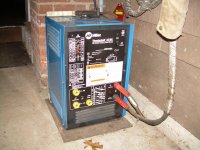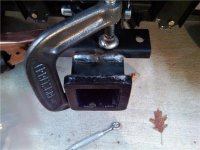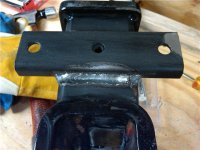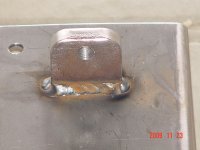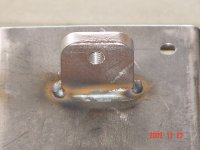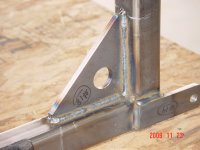Ah, the old "what welder to buy" question...followed by quite vocal opinions about stick vs wire, 110 vs 220 volt, red versus blue....
About wire feed (sometimes called MIG): I think there are two diametrically opposed schools of thought, each are absurd and the real truth is in-between. One school of thought says the 110 volt wire-feeds are just a toy, incapable of "real welding". The other extremity would be the absolutely beginner who buys a 110 volt wire-feed and thinks they can weld their Jeep frame that night, or that they can now weld thick structural stuff. In reality the 110 volt wire-feeds like the Hobart Handler 140 can do very good work within their limitations.
I now have 3 welders. I have a Lincoln 110 volt Weld Pak 100, loaded with .035 flux-core wire. Great for portability and outdoors work. Easily welds 3/16 inch if cleaned properly and good technique used. 1/4 inch is stretching it; do-able but ugly. Wouldn't want to use it for anything structural 1/4 or 3/8 inch or heavier, too cold. Must clean the slag off but a wire brush is all I usually need. For stuff like mower decks and thin steel it's incredibly useful though, very easy and the welds are good.
I also have a Hobart Handler 175, a 220 volt wire-feed running .035 solid wire with 100%CO2 gas. Works great on thicker stuff. Welds have great penetration even on thicker stuff IF the volts are set high enough, wire speed is acceptable, and stick-out is kept about 1/2 inch or so. Wouldn't hesitate to use it on structural/critical welds of 1/4 inch or 3/8 inch. But ya gotta run 220 to it (I have a 50 foot extension cord) and tote that tank around if you want to weld somewhere else, and welding outdoors must be done on calm days or using something to block the wind.
I also have a Lincoln AC/DC 225 "tombstone" buzzbox stick welder. Again, it's got it's place. Rusty or painted metal where surface prep isn't always possible? No problem, 6011 burns through the crud. But...technique is a tad more difficult, especially for out-of-position welding, and ya gotta clean slag off, and there's all those little stubs of electrodes to pick up later.
Bottom line, IMHO, there's no one "best welder". Folks have different requirements and different preferences. A welding class can expose you to different machines and processes, letting YOU decide what you need. Oh, and the instruction on proper technique would be good too!
